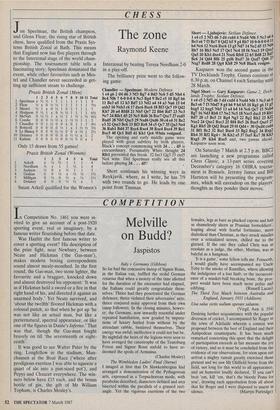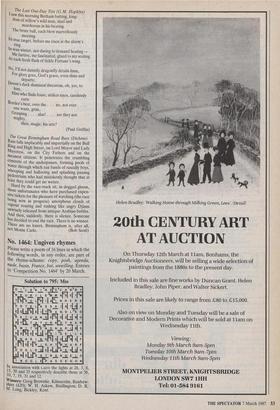COMPETITION
Melville on Budd?
Jaspistos
In Competition No. 1461 you were in- vited to give an account of a post-1920 sporting event, real or imaginary, by a famous writer flourishing before that date.
Was Hazlitt the first famous writer to cover a sporting event? His description of the prize fight, near Newbury, between Neate and Hickman (`the Gas-man'), makes modern boxing correspondents sound almost mealy-mouthed. In the first round, the Gas-man, two stone lighter, the favourite and a braggart, knocked down and almost destroyed his opponent: It was as if Hickman held a sword or a fire in that right hand of his, and directed it against an unarmed body.' Yet Neate survived, and `about the twelfth' floored Hickman with a colossal punch, so that when he got up 'he was not like an actual man, but like a preternatural, spectral appearance, or like one of the figures in Dante's Inferno.' That was that, though the Gas-man fought bravely on till 'the seventeenth or eight- eenth'.
It was good to see Walter Pater by the ring, Longfellow in the stadium, Mun- chausen at the Boat Race ('where after prodigious. exertion I was able to squeeze a quart of ale into a pint-sized pot'), and Pepys and Chaucer everywhere. The win- ners below have £15 each, and the bonus bottle of gin, the gift of Mr William Topham, is Charles Mosley's.
Italy v Germany (Gibbon)
So far had the concussive instep of Signor Rossi, in the Italian van, baffled the stolid German retiarius that when a moiety of the time allotted for the duration of the encounter had elapsed, the Italians could greatly congratulate them- selves. Thrice had they penetrated the German defences; thrice violated their adversaries' nets; thrice conjured noisy approval from their own camp followers. In the closing minutes, howev- er, the Germans, now inwardly resentful under repeated humiliation, now goaded by imputa- tions of luxury hurled from without by the attendant rabble, bestirred themselves. Their energy was awful; ineffective it could not but be. By nightfall the heirs of the legions were seen to have avenged the catastrophe of the Teutoburg Forest and Signor Rossi sixfold to have re- deemed the spoils of Arminius.
(Charles Mosley) The Wimbledon Ladies' Final (Sterne) I imaged at first that Dr Slawkenbergius had arranged a demonstration of the Pythagorean arts, expressed in a Terpsichorean mode, with parabolas described, diameters defined and arcs bisected within the parallels of a grassed rect- angle. Yet the vigorous exertions of the two
females, legs as bare as plucked capons and hair as shamelessly shorn as Prussian footsoldiers', leaping about with fearful fortissimo, more diabolical than Christian, as they struck missiles over a reticulated screen, chilled me to the gizzard. If the one they called Chris was as resolute as a judge, the other, Martina, was as baleful as a hangman.
'It is a game,' some fellow tells me. Forsooth, I would gladly have accompanied my Uncle Toby to the smoke of Ramillies, where allowing the indulgence of a lost limb, or the inconveni- ence of a musket-ball breaking bone, the pros- pect would have been much more polite and
edifying. (Russell Lucas) The Third Test Match between Australia and England, January 1933 (Addison) Una salus victis nullam sperare salutem.
(Virgil, Aen. ii. 354) Desiring further acquaintance with the popular diversion of cricket, I accompanied Sir Roger to the town of Adelaide wherein a contest was proposed between the best of England and their Antipodean counterparts. It has been much remarked concerning this sport that the delight of participation exceeds in fair measure the joy of victory, and so it must be concluded from the evidence of our observations, for soon upon our arrival a mighty tumult greatly exercised those present and we saw Mr Oldfield borne from the field, not long for this world to all appearance, and an humorist loudly declared, 'If you can't beat 'em, kill 'em, that's the bloody Poms for you', drawing such approbation from all about that Sir Roger and I were disposed to assent in
silence. (Martyn Partridge) The Last One-Day Test (G.M. Hopkins) I saw this morning Botham batting, king- dom of willow's wild man, mad and murderous in his beating The brute ball, each blow marvellously meeting Its true target, before me risen at the alarm's ring In wan winter, not daring to demand heating Me furtive, me fascinated, glued to my seating At each fresh flash of fickle Fortune's wing.
No, I'll not daintily dragonfly details limn, For glory goes, God's grace, even dims and departs; Doom's dark dismissal threatens, oh, yes, to him,
Him who flails fours, strikes sixes, carelessly carts
Border's best, over the . . . no, not over one waits, grim, Grasping . . . . alas! are they not mighty, then, magic, his arts? (Paul Griffin) The Great Birmingham Road Race (Dickens) Rain falls implacably and impartially on the Bull Ring and High Street, on Lord Mayor and Lady Mayoress, on the City Fathers and on the meanest citizens. It penetrates the crumbling concrete of the underpasses, forming pools of water through which run bands of rascally boys, whooping and hallooing and splashing passing pedestrians who had mistakenly thought that at least they could get no wetter.
Hard by the race-track sit, in dogged gloom, those unfortunates who have purchased expen- sive tickets for the pleasure of watching (the race being now in progress) amorphous clouds of vapour roaring and rushing like angry Djinns unwisely released from antique Arabian bottles. And then, suddenly, there is silence. Someone has decided to end the race. There is no winner. There are no losers. Birmingham is, after all,



























































 Previous page
Previous page